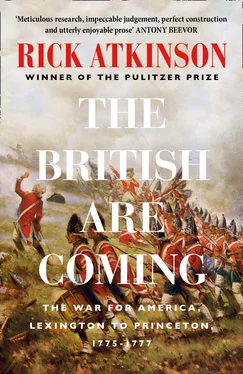Dramatic as the signal was, and as enduring in American iconography, it proved to be superfluous, since both Dawes and Revere successfully eluded British patrols to spread the word themselves. Handed the reins to a big brown New England mare, Revere swung into the saddle and took off at a canter across Charlestown Neck, hooves striking sparks, rider and steed merged into a single elegant creature, bound for glory.
Two hours later, Revere trotted into Lexington, his mount thoroughly lathered after outgalloping a pair of Gage’s equestrian sentinels near Charlestown. Veering north toward the Mystic River to avoid further trouble, Revere had alerted almost every farmstead and minute captain within shouting distance. Popular lore later credited him with a stirring battle cry—“The British are coming!”—but a witness quoted him as warning, more prosaically, “The regulars are coming out.” Now he carried the alarm to the Reverend Jonas Clarke’s parsonage, just up the road from Lexington Common. Here Clarke had written three thousand sermons in twenty years; here he called up the stairs each morning to rouse his ten children—“Polly, Betsey, Lucy, Liddy, Patty, Sally, Thomas, Jonas, William, Peter, get up!” And here he had given sanctuary, in a bedroom to the left of the front door, to the renegades Hancock and Samuel Adams.
A squad of militiamen stood guard at the house as Revere dismounted, spurs clanking. Two warnings had already come from the east: as many as nine mounted British officers had been seen patrolling the Middlesex roads, perhaps “upon some evil design.” At the door, a suspicious orderly sergeant challenged Revere, and Clarke blocked his path until Hancock reportedly called out, “Come in, Revere, we’re not afraid of you .” The herald delivered his message: British regulars by the hundreds were coming out, first by boat, then on foot. There was not a moment to lose.
Thirty minutes later, Dawes arrived with the same warning, and the two riders soon swung toward Concord. As Adams packed up to move deeper into the countryside, Hancock lumbered about the parsonage with his sword and pistol, prattling on about making a desperate stand until he, too, was persuaded to bolt for safety in his fine carriage.
Now the Lexington bell began to clang in the wooden tower, hard by the meetinghouse. More gallopers rode off to rouse half a hundred villages. Warning gunshots echoed from farm to farm. Bonfires flared. Drums beat. Across the colony, in an image that would endure for centuries, solemn men grabbed their firelocks and stalked off in search of danger, leaving the plow in the furrow, the hoe in the garden, the hammer on the anvil, the bucket at the well sweep. This day would be famous before it dawned.
Lexington spread across ten thousand acres, occupied by 750 people and 400 cows. Hardwood copses separated fields and pastures, and many small creeks snaked toward the distant Charles and Mystic Rivers. Two cleared acres had been given over to the Common, where the eleven-mile road from Charlestown approached straight and level for the final five hundred yards, then forked at the three-story meetinghouse, big and homely as a barn, before continuing to cover the six miles to Concord. On these two acres some 130 militiamen, summoned by that insistent pealing, milled about, stamping their feet against the nighttime chill. They awaited orders from their captain, John Parker, described as “a great tall man … with a high, wide brow.” Now forty-five, a farmer, father of seven, and sometime town assessor, he had fought as a sergeant in the French and Indian War at Louisbourg and Quebec. Shadows falling across the Common deepened the dark sockets around Parker’s eyes, symptomatic of the pulmonary tuberculosis that would kill him five months later.
Massachusetts Bay had been the first colony to form its militia into regiments, one per county in 1636, in an effort to fashion a military organization suitable for more than haphazard local defense. Each generation since had gone to war at least once; an estimated one in four able-bodied Massachusetts men had served in the last French war. Some militia units were little more than armed rabble, saluting unsuspecting officers by firing blank charges at their feet or sneaking up on young women before shooting into the air in a weird courtship ritual. Lexington’s troops, ranging in age from sixteen to sixty-six, were more disciplined; under militia rules, any man interrupting the clerk while he called the roll was fined two shillings. The town had no minute company but had voted money for drums, a carriage to bury the dead, and gunpowder, now stored in the meetinghouse.
A scout dispatched in search of redcoats returned around three a.m. to advise Parker that none could be found. Perhaps this was another false alarm, or a British feint. Rather than keep his men out in the cold to no purpose, the captain dismissed the company with orders to reassemble at the sound of a drum. Some men ambled home. Most headed to the red-doored Buckman Tavern, an ancient “public house of entertainment” with a double hip roof on the edge of the Common. Here they could find a crackling fire and a mug of warm flip, heated at the hearth with a hot iron.
Parker’s scout had not ventured far enough east. The British were coming on hard, spurred by the distant pop of warning shots and the gleam of alarm fires flaring on the horizon. Lieutenant Colonel Smith, the expedition commander, had heeded Gage’s order to lunge for the Concord River bridges with a “party of the best marchers”; six light infantry companies now hurried ahead of the main column. Assured by a passing teamster that a thousand rebels were in arms, Smith also sent a courier to Boston to plead for reinforcements, a wise impulse.
The vanguard making for Concord was led by John Pitcairn. Not only was Major Pitcairn, the marine, now on horseback and far from the sea to which he was accustomed; he was commanding more than two hundred men from a half dozen army regiments to whom he was a stranger. The Scottish son of a Fifeshire minister, portly and affable with heavy brows and full lips, Pitcairn could usually be found in Old North Church on Sundays, although his weekday profanity was described as “a Boston legend.” Now in his mid-fifties, he did not extend his geniality to rebels, who deserved only “severe chastisement.” “If I draw my sword but half out of my scabbard,” he had asserted, “the whole banditti of Massachusetts will run away.” The major, an American clergyman later suggested, was “a good man in a bad cause.”
As an apricot glow began to brighten the eastern sky soon after four a.m., the sounds of a country folk alert and alarmed intensified—bells, shots, distant hoofbeats. Pitcairn ordered his troops to halt and load their weapons, a portentous command. With practiced motions, each soldier plucked a paper cartridge from his waist pouch, bit open the end with his teeth, dribbled some powder grains into the musket flash pan, then poured the rest—close to half an ounce—down the muzzle, followed by the bullet and the cartridge wadding, which were tamped home with a steel ramrod. There was nothing precise about the Brown Bess—that “outspoken, flinty-lipped, brazen-faced jade,” in Rudyard Kipling’s description. Imperfect barrels, imperfect balls, a lack of sights, variable powder, and windage between ball and barrel meant the musket was marginally accurate at fifty yards, hopeless beyond a hundred. But that hardly mattered when bullets were fired in swarms at close range. The enormous lead slug, nearly three-quarters of an inch in diameter and an ounce in heft, could stop a charging bull.
At Pitcairn’s command, the men seated their ramrods and surged forward, breathing hard, pulses pounding. The fourteen-inch bayonets on their muskets protruded above their heads like a picket fence. Scraps of cartridge paper, spat out, littered the road behind them.
Читать дальше












